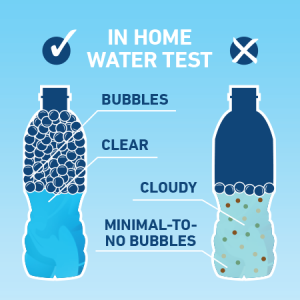The loudest indicator you may want to get your water checked out is if it contains a funny taste, color, or odor. There may not be anything wrong with the water, just like seemingly clean water may have unwanted contaminants. Water that smells might have high levels of hydrogen sulfide or sulfur bacteria. Taste and color can vary along with many properties found in water. All these things can easily be explained with quick and simple testing.
If you’ve moved into a new home, especially if you’ve purchased a home, it’s a great time to test your water and make any adjustments necessary to optimize your water supply. If over time you realize that your water use appliances are working less efficiently or have residue build up, this is another indicator that your water levels should be checked and optimized for the life of your appliances, as well as other fixtures around the home. Another instance you may want to call a professional is if there is a resident in the home with a compromised immune system and you want to take the most precautions possible.
If you’ve found yourself in any of these situations, you can find yourself a local water treatment professional and make an appointment for them to come to the home and test.. Another option is to take a sample of the water yourself and mail it to a qualified laboratory for testing. If done in the home, the test only takes but ten minutes. Some of the things being tested for are the following: bacteria, micro-organisms, hardness, PH, acidity, alkalinity, sulfur, nitrite, nitrate, metals, chlorine and pesticides.
Once the results are obtained, you or your water treatment professional will be able to compare what you’ve got against the recommendations for safe levels of each element. From there you will be given the appropriate suggestions to modify your home to eliminate or balance any issues. This may include installing water filters (of many sizes, placements, types and purposes) or a water softener, and further water testing appointments in the future!
Somewhat common and potentially poisonous elements that could be found in your water include fluoride, chlorine, many types of pesticides and gasoline additives. These things can cause serious damage to vital organs with long term exposure. Testing is an excellent first step and beyond that, you may decide to just use the water for certain purposes and purchase drinking water you know is pure. A simple test is worth the time and expense if you aren’t already aware of what kind of water you are working with!

 Water is very important to us. You will realize that we normally use it for drinking, cleaning and so on. You need water on a daily basis. Water can be hard or soft. You will realize that hard water normally takes time to lather with soap. Hard water can actually frustrate you. It can make your dishes to be spotty and even affect your skin. It can make your skin to be dry. It can also affect other appliances in your home. If you spot any of these signs, you are living in a hard water zone. You will realize that very few people normally have water softeners. Most homes in the United States have hard water. This is the reason why you should test whether your water is hard or soft.
Water is very important to us. You will realize that we normally use it for drinking, cleaning and so on. You need water on a daily basis. Water can be hard or soft. You will realize that hard water normally takes time to lather with soap. Hard water can actually frustrate you. It can make your dishes to be spotty and even affect your skin. It can make your skin to be dry. It can also affect other appliances in your home. If you spot any of these signs, you are living in a hard water zone. You will realize that very few people normally have water softeners. Most homes in the United States have hard water. This is the reason why you should test whether your water is hard or soft.